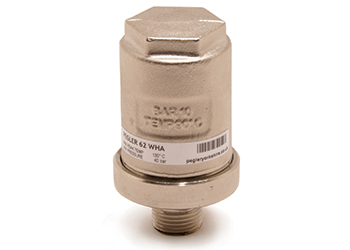Innovation boosts Pegler’s strength
01 September 2015
The approach to commercial valve specification is changing. PAUL REASBECK of British manufacturer Pegler Yorkshire explains how a quality range of commercial valves will make life easier for specifiers.
The commercial valve sector encompasses a wide variety of products, from 15-mm isolating ball valves for hot and cold water services through to 20-inch flanged steel ball valves. However, what customers look for are quality valves that provide them with tangible benefits.
Specification in the commercial valve sector has seen a marked shift in recent years. Traditionally, there has been a high percentage of ‘historical’ specification, meaning that it is important to specifiers that any change is driven by the need to have more benefits. The alternative must be more innovative; offer installed cost savings, more extensive guarantees, shorter lead times, enhanced customer service or better value for money.
In addition, the contract and the products used must be considered not just for the build period, but also from an operation and maintenance perspective. Factors such as whole-life costing have increased in importance with maintenance contracts typically supporting a building for up to 25 years. This means that there is an increased emphasis on the importance of product longevity, quality engineering, and cost-effective and straightforward commissioning and maintenance procedures, as well as the initial installation practicality considerations.
Pegler Yorkshire’s approach, therefore, is geared towards developing relationships with specifiers, contractors and installers who work with commercial valve products on projects across the Middle East. From the resulting ideas and feedback this generates, new products have been evolved which are inherently practical and, therefore, much more likely to be used on site with confidence. These relationships offer specifiers and installers reassurance in that their supply chain can deliver guaranteed quality products suitable for achieving optimal building performance through simplified commissioning.
Commissioning
Traditional methods of commissioning usually require a certain length of straight pipeline from the commissioning stations, excluding fittings, upstream from the valve to ensure correct flow measurement. This length can vary between five and 10 pipe diameters, depending on the manufacturers recommended guidelines.
The correct sizing and setting of commissioning valves cannot be overemphasised if the balancing of water distribution systems is to be successfully achieved. This continues to get easier, thanks to the innovations manufacturers such as Pegler Yorkshire are bringing to the market.
With more recently developed technology, such as that found in Pegler’s Venturi range, commissioning just got a whole lot easier. No straight lengths are required either up or down stream (except for immediately after a pump, which causes water turbulence) and this can be a considerable advantage in a tight plant room and offers a more elegant method of commissioning for modern buildings.
The Venturi’s key feature is its measuring orifice, which accelerates water flow. This increases the measured signal, ensuring the significant pressure loss common in other valve systems is recovered as it passes through. Energy is, therefore, not needlessly expended in pressure recovery, which makes these valves highly efficient. The trumpet-shaped design of the valve nozzle returns a higher, cleaner signal (typically 10 to 30 kpa dependent on flow rate) without the pressure loss, making for simpler and easier commissioning.
Product development
Continuation of innovative product development ensures building performance is optimised. And, partnerships enable manufacturers to develop products that are needed to make installations more efficient, through time, cost and performance. One element of discussions with contractors found the need for jointing that can be fitted heat free, while retaining its high integrity. So there is now a range of valves on the market alongside screwed valves, that benefit from the expertise of Pegler Yorkshire’s heat-free push-fit and press-fit technology which provide a system that is compact, quick to fit (up to 20 per cent faster than traditional methods) and delivers installed cost savings. Push and press can be used together, mounted on any valve and on a wide selection of pipework.
The latest product to hit the valve market is a Pegler Yorkshire Water Hammer Arrestor, which reduces the effects of water hammer in commercial or domestic pipeline applications. Ball valves, electronic mixers, solenoid valves and quarter-turn ceramic taps and mixers can all shut off flowing water quickly; this can result in a sudden increase in pressure and generate a shock wave that travels through the pipework. The new Pegler PEG62 Water Hammer Arrestor is designed to counteract this violent backpressure.
The half-inch valve is made from brass with a nickel-plated finish. Its design incorporates a stainless steel spring which offers increased absorption of energy and dissipates the pressure shock, which alleviates potential damage to pipework or additional valves or fittings.
Valve selection will always prove tricky for specifiers and contractors due to the number of products available. Yet with the emphasis on efficiency being key to the long-term running of a building, quality products from a trusted manufacturer are essential from the outset.
Established in 1888, Pegler’s main manufacturing facilities are located in Doncaster, (South Yorkshire) for brass working and Stourton, Leeds (West Yorkshire) for copper.
As an established leader in the valves and fittings markets, Pegler Yorkshire Group has been expanding its presence into the commercial valves specification sector within Gulf markets via its extensive range of products, customer service and partnership lead approach.
Pegler Yorkshire will be at The Big 5 show (Stand 2C90) being held at Dubai World Trade Centre in Dubai, UAE, in November.
- Innovation boosts Pegler’s strength
- ASTM to develop water sustainability standards
- Schneider Electric promises efficient water management



